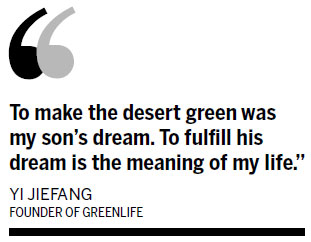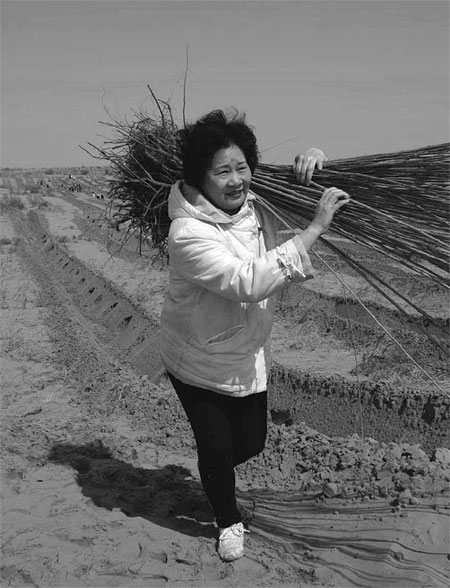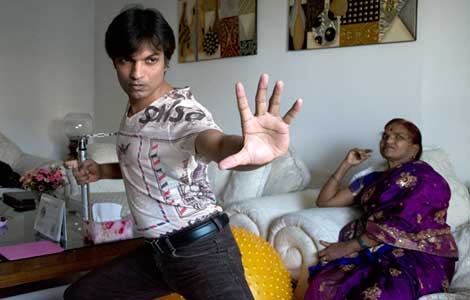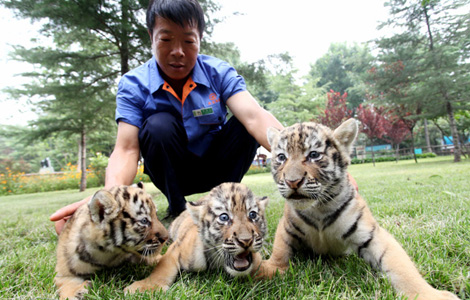Making the deserts bloom
Updated: 2013-07-30 08:11
By Wu Ni (China Daily)
|
||||||||
|
Yi Jiefang carries saplings in a greening project in the Inner Mongolia autonomous region. Provided to China Daily |

When Yi Jiefang's son was killed in a car accident, she thought her grief would overwhelm her. But the Shanghai native has found comfort in fulfilling her son's wish to help in the reforestation efforts in China's barren wastelands, finding herself becoming an unlikely environmental crusader. Wu Ni reports in Shanghai.
Yi Jiefang's world collapsed when her only son, Yang Ruizhe, 22, died in a road accident in Japan in 2000.
To work through her grief, the devastated mother decided to devote her life to fulfilling her son's last wish - planting trees in the desert.
Yi established the not-for-profit organization Greenlife in 2003, which has planted more than 1.1 million trees in deserts in northern China.
Earlier this year, at the age of 65, Yi started a new project - to plant 667 hectares of pine forest in Duolun county in the Inner Mongolia autonomous region. The county, with 1,400 square km of desertification, is where many of the sandstorms that affect Beijing start, as it is only about 400 km from the capital.
"To make the desert green was my son's dream. To fulfill his dream is the meaning of my life," she says.
Yi's early life was a long way from the desert. A Shanghai native, she had a stable job and a happy family. But the enterprising woman with big career ambitions moved to Japan by herself at age 38 to study.
Her husband and son joined her in the following years. The couple started a private Chinese medical clinic and the son, a diligent and excellent student, was admitted to the Chuo University in Tokyo.
Life was perfect, until the sudden death of her son. In the depths of her despair, Yi recalled that two weeks before his death, her son said he wanted to return to China to plant trees after graduating from university.
"Ruizhe was concerned about the environment. He often rode his motorbike to the mountain and described to me what beautiful sceneries he had seen," she recalls, tears welling up her eyes.
"His last words are deeply engraved in my mind. I sometimes even felt it might be God's will that I should go back to my country to plant trees," she says.
Her son's wish gave Yi the strength to rebuild her life. After living in Japan for 18 years, Yi sold the clinic and returned to Shanghai with her husband. They devoted all their savings, Ruizhe's life insurance payout and donations from friends, to the Greenlife project.
After her first field trip to the deserts of northern China, Yi chose the Tamin Chagan desert, nicknamed "the sea of death" in Hure Banner at Tongliao city in Inner Mongolia.
"Sand is everywhere," she says of her first impression of the county. "Even when I lay in bed, I could catch a handful of sand trickling through my fingers."
But the worse thing was the toilet. "The excrement was dried and piled up in the pits," she says. "That's understandable - who would waste water flushing the toilet when you barely have enough water to drink?"
However, 60 years ago, the county had lush grassland and plenty of water. Unrestrained deforestation turned the land barren and it was gradually eroded by desert.
Yi's project was to spend 10 years planting 1.1 million trees on the 10,000 mu (667 hectares) of sandy soil, equal to about 960 football fields. Local villagers were hired to plant trees and protect the saplings. After the trees have grown for 20 years, they will donate the trees to the villagers.
Yi has also planted many trees herself. The elegant city woman who used to bathe twice a day and always have fresh flowers in her home, now spends much of her time in the desert, often in sandstorms and battling extreme temperatures.
Zhang Haitao, a young musician in Beijing, became a Greenlife volunteer in 2011. "First it was Yi's story that touched me. When I actually went to the desert, I learned much about environmental protection from her, which I did not care about before."
Yi says dramatic changes have occurred in Hure Banner.
"Some of its sandy soil has turned back into grassland. Villagers can grow watermelons on it. And the local river used to be dry to the bottom, now it has fish to catch."
Determined to recreate the miracle in other deserts, Yi started her second project in Dengkou county in western Inner Mongolia, aiming to plant 667 hectares of sacsaoul trees in the Ulan Buh desert. They have so far planted 133 hectares, with a survival rate of over 85 percent.
The success has brought her numerous honors. At Greenlife's headquarters in Shanghai's Hongkou district, a large glass cabinet showcases dozens of honor certificates she has won, such as the Seventh China Charity Award in 2012, Outstanding Female Role Models in 2011 and National Afforestation Medal in 2010, to name just a few.
All the honors, however, do not really matter to her, Yi says, but they are important for Greenlife because the fame can help the organization attract more donations.
Climate change, growing population and economic development are the main causes of land degradation, making China one of the countries most seriously affected by land degradation in the world
Some 400 million Chinese people's livelihoods are affected by desertification, which affects up to 27.46 percent of the total land area, says Sun Zhagen, deputy chief of the Chinese Forestry Administration in a forum in May.
"Just take away all this fame or fortune, and give my son back to me, that's all I would ask," Yi says, "but reality is so cruel. My son won't be back. Devoting myself to the plantation gave me some psychological comfort - had my son seen the forests, he would have felt happy."

Xi Yanling, 60, from Beijing, also lost a child and has found comfort working for Greenlife. Xi's daughter, who also loved nature, died of cancer when she was in university. The grieving mother found planting trees a good way to work through her sorrow.
She joined Greenlife in 2010 and became a core member of the group.
"When we lost our children, besides sadness, we felt lost because our love did not have a focus. By planting trees and improving environment, we feel our love is extended as it is for all children's benefit. In this sense, I think Yi is a great mother," Xi says.
For Yi and Xi, the most valuable legacy for their children is planting trees.
"In China, parents save money for their children. They buy big houses and luxury cars for them. But ultimately, it is the good environment, the clean air and safe water that will improve their lives," Yi says.
Contact the writer at wuni@chinadaily.com.cn.
(China Daily USA 07/30/2013 page10)
Most Viewed
Editor's Picks

|

|

|

|

|

|
Today's Top News
Former US president plans to visit DPRK
China struggles to retain talents
Families of crash victims to sue Asiana in the US
Detroit: Gold mine for China
Major SOEs eye profits from abroad
Train collision kills at least 44 in Switzerland
Sino-Japanese summit ruled out
Manila's base plan targets China
US Weekly

|

|
















